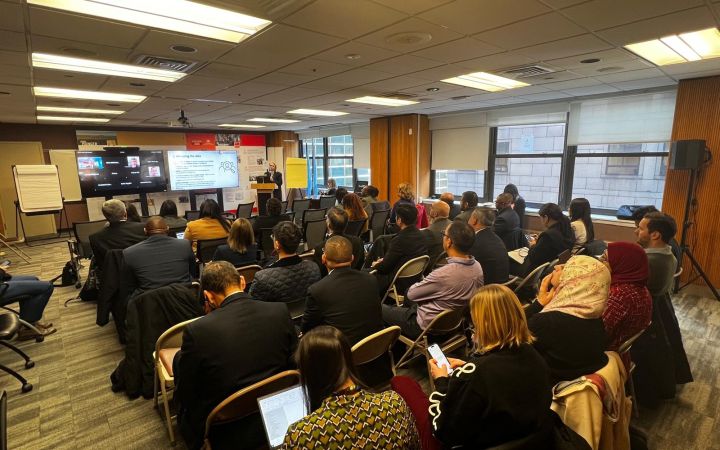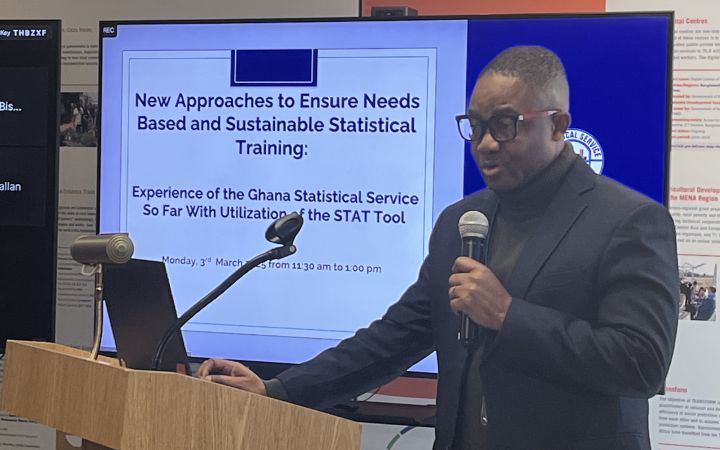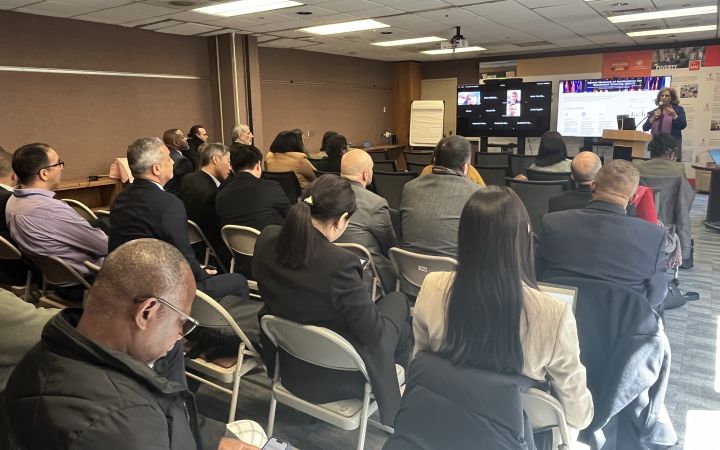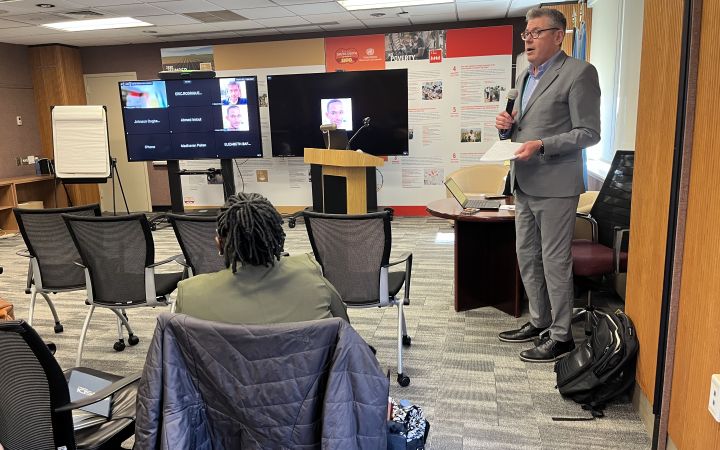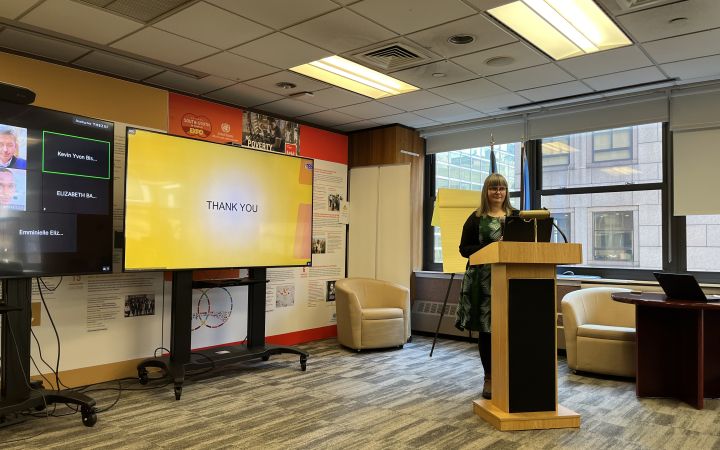25 April 2025, Geneva, Switzerland - A side event “New approaches to ensure needs based and sustainable statistical training” held before the opening of the 56th session of the UN Statistical Commission has been an opportunity to discuss the work of the Global Network of Institutions for Statistical Training (GIST) in supporting National Statistical Offices to adopt country-owned, innovative and sustainable approaches to capacity-building. Four countries have shared their experiences, including Kenya, Morocco, Seychelles that used the STAT tool developed by GIST in 2024, and Ghana that was among the first pilot countries of the STAT process together with Colombia in 2023. This exchange has demonstrated the usefulness of the methodology developed by GIST that empowers NSOs to adopt more strategic approaches to developing their capacities.
During her opening remarks Elena Proden, who currently serves as GIST Chair and has been supporting this work on behalf of UNITAR, highlighted the value added of the Network in harnessing the global expertise and building partnerships between and within international, regional and national training providers. She has also presented the STAT tool covering 157 skillsets and explained its role in enabling NSOs not only to assess the needs of their staff by exploring both individuals’ and managerial perspectives but also to enable them to think more long-term, beyond annual training plans, and discuss how to promote a more enabling institutional environment by strengthening learning culture within organizations and better leveraging informal learning in combination with global and regional learning content for more impact at less cost.
Many NSOs use traditional approaches to training by either nominating their staff to participate in international or regional customized formal training programmes or delivering their own. The needs, however, remain significant and undergo a fast-pacing change due to technological innovations and opportunities created by new data sources among other. The cost of delivering formal training programmes is high preventing from more employees to benefit from them while many NSOs in developing countries are also facing high staff attrition levels. In addition, the approaches are often fragmented, driven by the external supplies and opportunities. Staff are not always incentivized or have no possibilities to take responsibility for learning. There is often a lack of willingness or systems to share knowledge. The need for more strategic, forward-looking, nationally driven, sustainable and agile approaches to developing core competencies within National Statistical Offices and Systems has been broadly acknowledged.
Vibeke Nielsen who has been leading UNSD’s work on STAT has first convened the most recent pilot countries pointing to differences in contexts and inviting them to share their experiences and immediate outcomes. Kevin Bistoquet, Deputy CEO of Seychelles NBS has shared the experience of his country where, due to its small size, the entire NSO team was fully involved in the STAT exercise leading to the production of the institutional learning plan and a draft competency development strategy while aiming to address some of the identified challenges such as resistance to change. Morocco’s experience shared by Hasnae Fdhil, Head of Communication and Cooperation at High Commission for Planning, has highlighted how an improved use of integrated, including informal, learning, prioritization of job-relevant skills, continuous learning, onboarding new employees, and better plugging in international cooperation to support national capacity building efforts can become a game-changer in a larger statistical organization in addition to the existing use of in-house experts as trainers. Sarah Bonaneri Omache from Kenyan Bureau of Statistics, the latest addition to the STAT process, has shared how the STAT process helped her Organization initiate a more needs-oriented and strategic approach to statistical capacity-building. While most of the work is still ahead, the STAT pilot has reconfirmed the need to rethink the current approaches and learn from other STAT countries.
Finally, both Ghana and Colombia who implemented the STAT pilots in 2023 have gone a long way ahead in developing their national responses to capacity-building needs. Ghana Statistical Service’s representative Peter Takyi Peprah has shared information about the STAT pilot covering both NSO and Ministries, Departments and Agencies, the resulting institutional training strategy, competency mapping, and the 2025 training plan linked to performance appraisal. This has also been an opportunity for GSS to introduce innovative approaches that could benefit other countries: from combining self-paced learning with learning groups (hybrid learning) and empowering managers to become change agents on knowledge sharing and innovation to brokering partnerships with regional training centers and leveraging AI in statistical production.
While GIST is committed to advising STAT countries as they go through the process, within its capacity and budget constraints, some of the countries may be ready to do it on their own, as was the case with Colombia and Ghana who have led the way after the initial GIST support in 2023, noted Vibeke Nielsen. A knowledge exchange is planned between STAT pilot countries to address the need for mutual learning, she added. Gabriel Gamez, who will be overseeing the GIST work moving forward on behalf of UNSD, has invited other NSOs to join the STAT process and has welcomed the creation of the new Task Team learning and sharing culture within NSOs. This Task Team created in 2025 will complement the work of the Task Team on NSO needs that led the STAT work and is currently undertaking the mapping of learning offerings to enhance their promotion through statistics.unsdglearn.org
GIST was created in 2017 to promote collaborations across statistical training institutions to better meet the needs at country level also held its annual meeting on 10 February, marking a renewal in the composition of Task teams and several new members taking on leadership roles. It earlier held its fourth GROW webinar dedicated to statistical literacy and citizen data with Julieth Alejandra Solano Villa from Colombian NSO and Al Kags from Open Data Institute, Kenya, as guest speakers and introduction by Elena Proden from UNITAR as GIST Chair. The webinar open to public aimed to explore the synergies between the work of the Collaborative on Citizen Data and statistical literacy initiatives that are the focus of a dedicated GIST Task Team led by Pedro Campos, Statistics Portugal, and Bianca Walsh, Brazilian NSO. Colombia’s recent adoption of the 2023 statistical law making the principle of inclusion mandatory reflecting the country’s diversity in statistical production, as well as the work on statistical literacy in support of the implementation of the National Statistical Plan were to culminate in the upcoming national workshop on citizen data. Open Data Institute in Kenya has been supporting citizen agency in communities to collect and analyse data about issues important to these communities strengthening accountability and improving outcomes on the ground.
UNITAR also contributed to two other side events of the 56th session of the Statistical Commission improving the awareness around citizen data. On 20 February, the International Statistical Institute held a virtual side event entitled “Practical Application of Non-Traditional Data in the Production of Official Statistics”. While Dr. Anders Holmberg from the Australian Bureau of Statistics, Dr. Oliver Chinganya, former Director of the African Centre for Statistics, UNECA, and Mr. Prof. Setia Pramana, Politeknik Statistika STIS, discussed the readiness of NSO to embrace a range of non-traditional sources from such as satellite imagery, social media, mobile positioning data, vessel data, web scraping and business transactions data, Elena Proden presented the new Copenhagen Framework on Citizen Data developed by the Collaborative on Citizen data and subsequently approved by the56th UN Statistical Commission. The use cases of citizen data have also been discussed during a number of other side events, including a side event entitled “With and For Citizens: Strengthening Partnerships Between NSOs and Communities Through Citizen Data” organized by Open Data Watch on 11 February and moderated by Elena Proden, UNITAR. The event has brought a range of perspectives showcasing the meaning of citizen data and going from UN entities (Yongyi Min, UNSD, and Nicolas Fasel, OHCHR) to NSOs (Rishi Ram Sigdel, Nepal NSO, and Fiona Dawe, UK ONS), national CSO partnerships (Florence Syevuo, Kenya SDG Forum), international statistical partnerships and NGOs (Liliana Suchodolska, PARIS21 and Francesca Perucci, Open Data Watch) to academia (Dilek Fraisl, IIASA).


